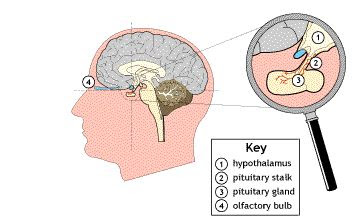INTRODUCTION
Pituitary gland is also referred as the ‘Master gland’ since it controls many other glands. The alternative name of pituitary gland is ‘Hypophysis’.
LOCATION
 |
| LOCATION OF PITUITARY GLAND |
Image Source : Wikimedia Commons
It measures about 1cm in diameter or the size of the pea. Pituitary gland located below the neural structure -hypothalamus of the brain and behind the bridge of our nose. The hypothalamus gland sends the signals to the pituitary gland and thus it secretes hormones in to the blood stream.
STRUCTURE
The structure of pituitary gland divided into three sections or lobes.
 |
| STRUCTURE OF PITUITARY GLAND |
Image Source : Wikimedia Commons
(i) Anterior Lobe (Adenohypophysis): The anterior lobe of the pituitary gland has primary roles in the development of the human body. The releasing hormone from the hypothalamus controls the functions of this lobe. This lobe secretes six major hormones.
- Adrenocorticotrophic hormone (ACTH): This hormone acts with the cortex of the Adrenal glands to stimulate the creation of the stress hormone, cortisol. Cortisol controls blood pressure and glucose levels in the blood.
Disorders: ACTH deficiency will cause nausea, body aches, poor appetite, and low blood sugar level and pressure.
- Growth Hormone (GH): The alternative name for this hormone is ‘Somatotrophic hormone’. This is a protein hormone, which has 190 amino acids, those are synthesised and discharged by the cells called somatotrophs in the anterior pituitary lobe. GH assists in the reproduction of new cells, cell regeneration and induces the growth of bones, muscles and other organs by synthesizing protein.
Disorders: Hypo secretion of GH or less secretion of this hormone in the child, results in pituitary dwarf i.e. the child looks shorter than usual. Insufficient secretion of growth hormone leads to decrease muscle mass and weakens bone density, which has a lifelong effect.
Excess secretion of GH in child results in tall or gigantic appearance, untypical growth of bones and soft tissues results in heart problems and sleep apnoea.
- Thyroid stimulating hormone (TSH) or Thyrotropin: This hormone stimulates the glandular cells of the thyroid to secrete thyroid hormone. The thyroid helps in coordinating the metabolic activities.
Disorders: TSH deficiency results in fatigue, memory loss, and body weakness.
If there is hypersecretion of TSH results in enlargement of thyroid gland and it secretes more hormone, shakiness, irritability, and high blood pressure.
- Follicle stimulating hormone (FSH): This hormone in male triggers production of sperm and in female it helps in production of egg and maturation.
Disorders: Hypo secretion of FSH leads to decrease in libido, irregular menses, erectile dysfunction, and mood changes.
Hypersecretion results in infertility (impotent) and uneven menstruation.
- Prolactin (PRL): In females, this induces to produce two hormones namely Oestrogen and Progesterone. At the time of pregnancy, PRL helps in the growth of glandular tissues of the breast and triggers to produce milk after the birth of the baby.
Disorders : Deficiency of PRL results in inability to lactate.
Excess production of PRL results in inappropriate expression of breast milk that can occur in women or men, and it can leads to weakening of bones.
- Luteinzing hormone (LH) : LH and FSH hormones both works together. In females, it process in ovulation and makes the uterus ready for pregnancy, in males these hormones help in the secretion of testosterone.
Disorders: It is same as like FSH. Insufficient of LH leads to weak in libido, uneven menses, erectile dysfunction, and changes in mood.
Excess secretion results in impotent and uneven menstruation.
(ii) The intermediate Lobe : It is a thin layer of cells in the humans. These cells get triggered and releases a hormone or pigment called melanocytes which controls the pigmentation. This melanocytes is responsible of variation in the colour of skin.
(iii) Posterior Lobe (Neurophpophysis) : This lobe preserves and release the hormones secreted by the hypothalamus. This lobe secretes two hormones.
- Antidiuretic hormone (ADH) : This hormone holds water content in the body. ADH helps in reabsorption of water by the kidney tube by increasing the kidney's permeability so the water cannot lose in urine. This hormone helps the tissues to keep hold of as much water as feasible. ADH released if the pituitary cognize that the blood is lack of water.
Disorders : Lack of ADH secretion leads to extreme loss of water in the urine.
- Oxytocin (OT) : OT also known as ‘the love molecule’ since it is related to emotional processing within the brain which stimulates the feeling of “love”. OT also helps in contraction of the smooth muscles of the uterus during childbirth and stimulates the breast tissues (milk ducts) to secrete milk.
DISORDERS
- The most general form of pituitary gland disability is tumors. There are several types of pituitary tumors. Many people suffer from vision problems, headaches, menstrual changes, infertility, mood changes, fatigue, and even Cushing’s syndrome.
- Cushing’s has its own set of symptoms together with high blood pressure and weight gain, secondary to excessive ACTH release.
- The most common type of pituitary tumour called a “non-functioning” tumour, i.e., inability to produce hormones. These patients will have complications with their vision and headaches.
- Hyper and hypo secretion affects the pituitary gland.
- The other disorder is the craniopharyngioma. It is a kind of cyst or tumour, which is congenital (present at the time of birth). This leads to vision problem, headaches, sleeping issues.
- The next is ESS or empty sella syndrome; it affects the bony structure of the brain. A small defect or primary ESS puts high pressure on the bones and makes the pituitary gland flatten. The secondary ESS happens after the surgery or an injury making this gland worsen. The symptoms are pituitary function loss, infertility and fatigue.
CONCLUSION
Pituitary Gland is one of the significant glands in the human body. It helps in the secretion of many hormones and it triggers other gland to secrete the hormones for the proper functioning of the human body.



No comments: